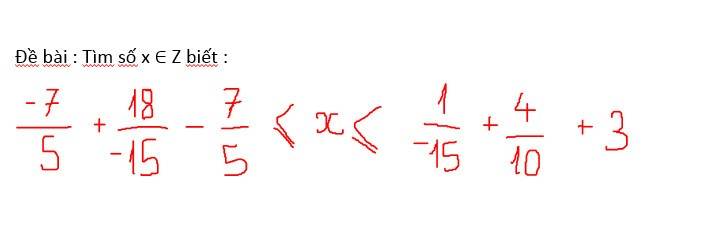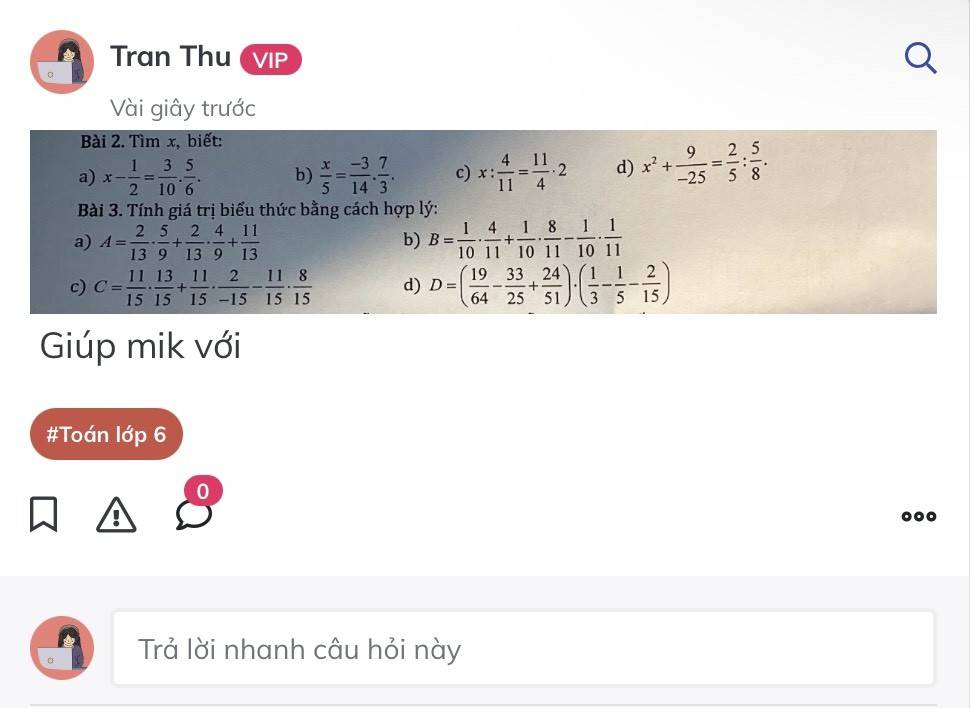
Hãy nhập câu hỏi của bạn vào đây, nếu là tài khoản VIP, bạn sẽ được ưu tiên trả lời.




\(\dfrac{1}{n\left(n+1\right)}=\dfrac{1+n-n}{n\left(n+1\right)}=\dfrac{n+1}{n\left(n+1\right)}-\dfrac{n}{n\left(n+1\right)}=\dfrac{1}{n}-\dfrac{1}{n+1}\)

4.
\(\dfrac{x-7}{y-6}=\dfrac{7}{6}\Rightarrow\dfrac{x-7}{7}=\dfrac{y-6}{6}=\dfrac{-y+6}{-6}\)
Áp dụng tính chất dãy tỉ số bằng nhau:
\(\dfrac{x-7}{7}=\dfrac{-y+6}{-6}=\dfrac{x-7-y+6}{7-6}=\dfrac{x-y-1}{1}=-5\)
\(\Rightarrow\left\{{}\begin{matrix}x-7=7.\left(-5\right)=-35\\-y+6=\left(-6\right).\left(-5\right)=30\end{matrix}\right.\)
\(\Rightarrow\left\{{}\begin{matrix}x=-28\\y=-24\end{matrix}\right.\)
5.
Ta có:
\(A^2=\dfrac{2^2.4^2.6^2...4998^2.5000^2}{3^2.5^2.7^2...4999^2.5001^2}< \dfrac{2^2.4^2.6^2.4998^2.5000^2}{\left(3^2-1\right)\left(5^2-1\right)\left(7^2-1\right)...\left(4999^2-1\right)\left(5001^2-1\right)}\)
\(\Rightarrow A^2< \dfrac{2^2.4^4.6^2...4998^2.5000^2}{2.4.4.6.6.8...4998.5000.5000.5002}=\dfrac{2^2.4^4.6^2...4998^2.5000^2}{2.4^4.6^2...4998^2.5000^2.5002}\)
\(\Rightarrow A^2< \dfrac{2}{5002}=\dfrac{1}{2501}< \dfrac{1}{2500}\)
\(\Rightarrow A< \dfrac{1}{50}\)
\(\Rightarrow A< 0,02\)
Bài 3:
\(A=B\) khi:
\(\dfrac{7}{y-2}=x+1\left(y\ne2\right)\)
\(\Rightarrow\left(x+1\right)\left(y-2\right)=7\)
Mà: x,y nguyên \(\Rightarrow x+1,y-2\inƯ\left(7\right)=\left\{1;-1;7;-7\right\}\)
Ta có bảng sau:
| x + 1 | 1 | -1 | 7 | -7 |
| y - 2 | 7 | -7 | 1 | -1 |
| x | 0 | -2 | 6 | -8 |
| y | 9 | -5 | 3 | 1 |

Bài 2:
a; \(x\) - \(\dfrac{1}{2}\) = \(\dfrac{3}{10}\).\(\dfrac{5}{6}\)
\(x\) - \(\dfrac{1}{2}\) = \(\dfrac{1}{4}\)
\(x\) = \(\dfrac{1}{4}\) + \(\dfrac{1}{2}\)
\(x\) = \(\dfrac{3}{4}\)
Vậy \(x\) = \(\dfrac{3}{4}\)
b; \(\dfrac{x}{5}\) = \(\dfrac{-3}{14}\) \(\times\) \(\dfrac{7}{3}\)
\(\dfrac{x}{5}\) = \(\dfrac{-1}{2}\)
\(x\) = \(\dfrac{-1}{2}\) \(\times\) 5
\(x\) = \(\dfrac{-5}{2}\)
Vậy \(x\) = \(\dfrac{-5}{2}\);
c; \(x\) : \(\dfrac{4}{11}\) = \(\dfrac{11}{4}\) \(\times\) 2
\(x\) : \(\dfrac{4}{11}\) = \(\dfrac{11}{2}\)
\(x\) = \(\dfrac{11}{2}\) \(\times\) \(\dfrac{4}{11}\)
\(x\) = 2
Vậy \(x\) = 2
d; \(x^2\) + \(\dfrac{9}{-25}\) = \(\dfrac{2}{5}\) : \(\dfrac{5}{8}\)
\(x^2\) - \(\dfrac{9}{25}\) = \(\dfrac{16}{25}\)
\(x^2\) = \(\dfrac{16}{25}\) + \(\dfrac{9}{25}\)
\(x^2\) = \(\dfrac{25}{25}\)
\(x^2\) = 1
\(\left[{}\begin{matrix}x=-1\\x=1\end{matrix}\right.\)
Vậy \(x\)\(\in\) {-1; 1}
Bài 3:
a; A = \(\dfrac{2}{13}\)\(\times\) \(\dfrac{5}{9}\)+ \(\dfrac{2}{13}\)\(\times\)\(\dfrac{4}{9}\) + \(\dfrac{11}{13}\)
A = \(\dfrac{2}{13}\) \(\times\)(\(\dfrac{5}{9}\) + \(\dfrac{4}{9}\)) + \(\dfrac{11}{13}\)
A = \(\dfrac{2}{13}\) \(\times\) \(\dfrac{9}{9}\) + \(\dfrac{11}{13}\)
A = \(\dfrac{2}{13}\) + \(\dfrac{11}{13}\)
A = 1
b; B = \(\dfrac{1}{10}\).\(\dfrac{4}{11}\) + \(\dfrac{1}{10}\).\(\dfrac{8}{11}\) - \(\dfrac{1}{10}\).\(\dfrac{1}{11}\)
B = \(\dfrac{1}{10}\) x (\(\dfrac{4}{11}\) + \(\dfrac{8}{11}\) - \(\dfrac{1}{11}\))
B = \(\dfrac{1}{10}\) x (\(\dfrac{12}{11}\) - \(\dfrac{1}{11}\))
B = \(\dfrac{1}{10}\) x \(\dfrac{11}{11}\)
B = \(\dfrac{1}{10}\)

Lời giải:
a.
$=\frac{3}{5}-\frac{7}{4}=\frac{12-35}{20}=\frac{-23}{20}$
b.
$=-(2+\frac{5}{8})=-\frac{21}{8}$
c.
$=-(\frac{1}{8}+\frac{5}{9})=-\frac{9+8.5}{8.9}=\frac{-49}{72}$
d.
$=\frac{6}{13}-\frac{14}{39}=\frac{18}{39}-\frac{14}{39}=\frac{4}{39}$
e.
$=\frac{-3}{4}+\frac{5}{7}=\frac{5}{7}-\frac{3}{4}$
$=\frac{20-21}{7.4}=\frac{-1}{28}$

Bài 5
1) x ∈ Ư(18) = {1; 2; 3; 6; 9; 18}
x ∈ B(4) = {0; 4; 8; 12; 16; 20; ...}
Vậy không tìm được x thỏa mãn đề bài
2) x ∈ Ư(20) = {1; 2; 4; 5; 10; 20}
x ∈ B(2) = {0; 2; 4; 6; 8; 10; 12; 14; 16; 18; 20; ...}
⇒ x ∈ {2; 4; 10; 20}
3) x ∈ B(12) = {0; 12; 24; 36; 48; ...; 96; 108; ...}
Mà 30 ≤ x ≤ 100
⇒ x ∈ {36; 48; ...; 96}
4) x ∈ Ư(150) = {1; 2; 3; 5; 6; 10; 15; 25; 30; 50; 75; 150}
Mà x ≤ 50
⇒ x ∈ {1; 2; 3; 5; 6; 10; 15; 25; 30; 50}
5) 70 ⋮ x và 168 ⋮ x
⇒ x ∈ ƯC(70; 168)
Ta có:
70 = 2.5.7
168 = 2³.3.7
⇒ ƯCLN(70; 168) = 2.7 = 14
⇒ x ∈ ƯC(70; 168) = Ư(14) = {1; 2; 7; 14}
Mà x > 10
⇒ x = 14
6) Ta có:
(1995 + 2005 + x) ⋮ 5
1995 ⋮ 5
2005 ⋮ 5
⇒ x ⋮ 5
⇒ x ∈ B(5) = {0; 5; 10; 15; 20; 25; 30; 35; 40; ...}
Mà 23 < x ≤ 35
⇒ x ∈ {25; 30; 35}
Bài 6
1) Do 17x2y chia hết cho 2 và 5 nên y = 0
⇒ Số đã cho có dạng: 17x20
Để 17x20 chia hết cho 3 thì (1 + 7 + x + 2 + 0) ⋮ 3
⇒ (10 + x) ⋮ 3
⇒ x ∈ {2; 5; 8}
Vậy x ∈ {2; 5; 8}; y = 0
2) Do 234xy chia hết cho 2 và 5 nên y = 0
⇒ Số đã cho có dạng: 234x0
Để 234x0 chia hết cho 9 thì (2 + 3 + 4 + x + 0) ⋮ 9
⇒ (9 + x) ⋮ 9
⇒ x ∈ {0; 9}
Vậy x ∈ {0; 9}; y = 0
3) Do 4x6y chia hết cho 2 và 5 nên y = 0
Mà x - y = 4
⇒ x = 4 + y
⇒ x = 4
Vậy x = 4; y = 0
4) Do 57x2y chia hết cho 5 nhưng không chia hết cho 2 nên y = 5
⇒ Số đã cho có dạng 57x25
Để 57x25 chia hết cho 9 thì (5 + 7 + x + 2 + 5) ⋮ 9
⇒ (19 + x) ⋮ 9
⇒ x = 8
Vậy x = 8; y = 5








\(D=\left(1-\dfrac{1}{2^2}\right)\left(1-\dfrac{1}{3^2}\right)...\left(1-\dfrac{1}{99^2}\right)\)
\(D=\dfrac{2^2-1}{2^2}\cdot\dfrac{3^2-1}{3^2}...\cdot\dfrac{99^2-1}{99^2}\)
\(D=\dfrac{\left(2+1\right)\left(2-1\right)}{2^2}\cdot\dfrac{\left(3+1\right)\left(3-1\right)}{3^2}\cdot...\cdot\dfrac{\left(99+1\right)\left(99-1\right)}{99^2}\)
\(D=\dfrac{3\cdot1}{2^2}\cdot\dfrac{4\cdot2}{3^2}\cdot\dfrac{5\cdot3}{4^2}\cdot\dfrac{6\cdot4}{5^2}\cdot...\cdot\dfrac{100\cdot98}{99^2}\)
\(D=\dfrac{1\cdot2\cdot3^2\cdot4^2\cdot5^2\cdot6^2\cdot...\cdot98^2\cdot99\cdot100}{2^2\cdot3^2\cdot...\cdot99^2}\)
\(D=\dfrac{2\cdot99\cdot100}{2^2\cdot99^2}\)
\(D=\dfrac{100}{2\cdot99}\)
\(D=\dfrac{50}{99}\)